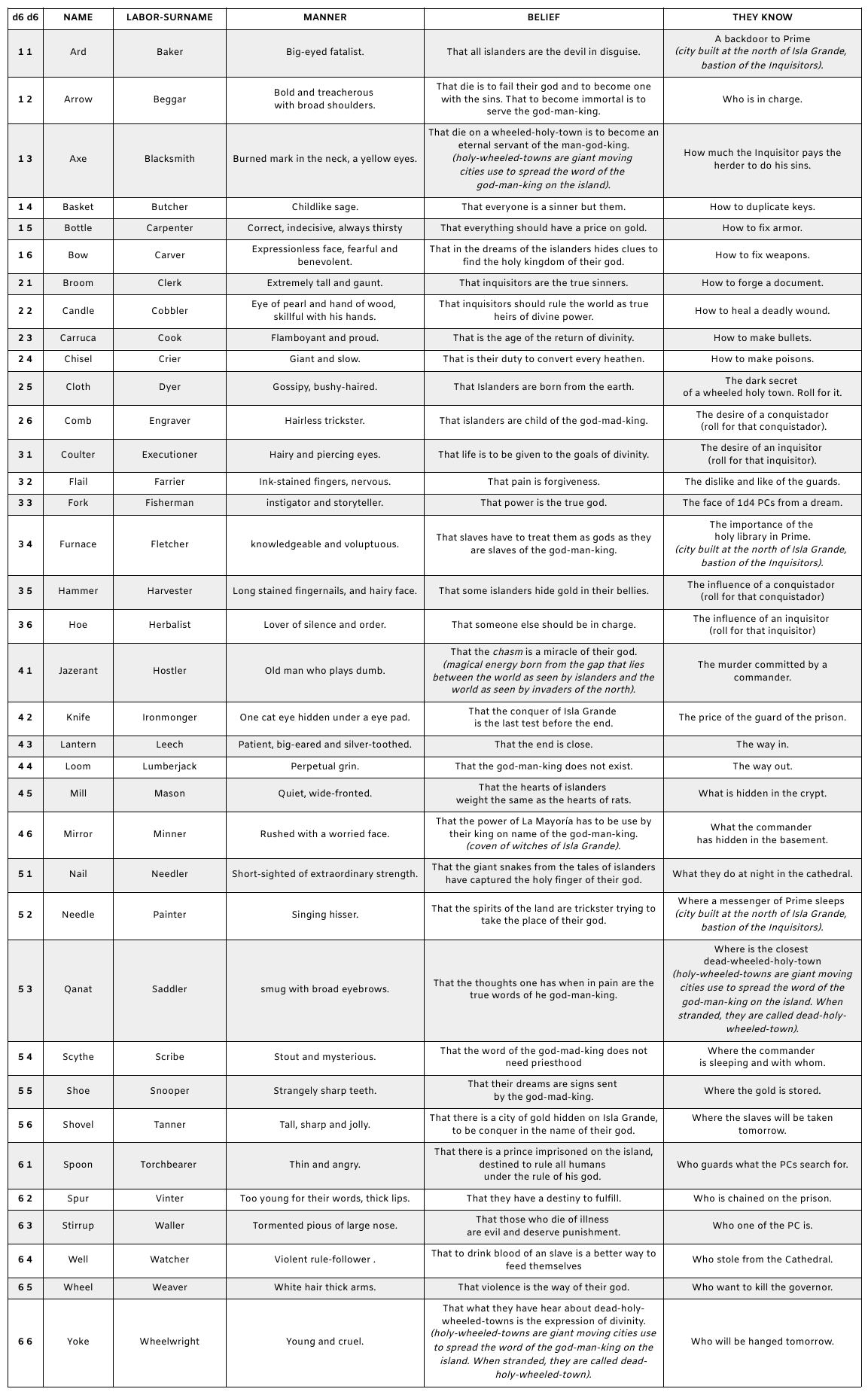Today, I want to share with you the main “antagonists” of NPFTH: Conquistadors and Inquisitors (of which I shared a little in this post), as well as the settlers from the north who have come with them.
As for all the previous posts of NPFTH, if you want to use them in any of your OSR-like games here there is a simple conversion for OSE and Mork-Borg:
CONVERSION FOR OTHER OSR GAMES
This NPCs make references to something call “Grief” and sometimes to another tactic/attribute/stat of the PCs, so if you want to use them in your OSR game…
…for something like OSE you can use this:
Grief → XP or Treassure carried by PCs or sum of both (divided by 1000).
Blood → HP (this is for mortal creatures)
Strong → STR
Agile → DEX
Imposing → CHA
Resilient → CON
Sneaky → DEX
Observant → WIS
Shields dies d4/d6/d8/d10 → AC +1/+1/+2/+2
…for something like MÖRK BORG you can use this:
Grief → Omens, or Silver dived by 100, or the sum of both.
Blood → HP (this is for mortal creatures)
Strong → Strenght
Agile → Agility
Imposing → Presence
Resilient → Toughness
Sneaky → Agility
Observant → Presence
Shields dies d4/d6/d8/d10 → Damage reduction -1/-1/-2/-2
…In the case of Conquistadors (for Mork Borg and OSE)
Violence → When doing something physical.
Pride → When doing something social.
…In the case of Inquisitors (for Mork Borg and OSE)
Torture → When doing something physical.
Intimidation → When doing something social.
…for both you could also add this:
Let the PCs spend “X” HP to increase their roll by “X”.
Let PC to sacrifice a weapon/shield to prevent damage.
Allows PCs to gain Dominance (added to all combat rolls, represented by any kind of token) by doing something that gives them an advantage (better combat stance, stunt, intimidation, making the terrain change, etc…) → They need to roll to acquire it, it is cumulative and on a failed roll they lose it all.
Conditions modify the rolls of anything that make sense (spring ankle will hinder jumping, confused will hinder perceptions, anger will hinder interactions, etc…). Conditions stack.
If you dont want to use Conditions, then make them do as much d4 damage as their mnodifiers (ex: Sorrow -2 → 2d4 damage).
“Tags” are word that accompany a weapon/shield. In a NAT 20, you can give that word as a condition to your adversary, or apply any special rules pecified by the tag.
If anything has just one stat, it can use it for everything.
If anything make reference to number of Compulsions, you can remplace it with number of weapons or valuable belongings
If there is reference to advantage/disadvantage roll twice and use best/worst result.
They all look thirsty, they all are violent, they all desire gold, and they all create their own myths about your home, Isla Grande.
Roll d6-d6 for each column in the next table to create a Conquistador:

Inquisitors belong to one of seven orders: Lunate, Hamate, Triquetrum, Pisiforme, Capitatum, Carpalia, and Phalanx. Being Phalanx the order that oversees all the others.
In each order, there are six specialities that can be fulfilled by its members, being Oculus the one that oversees the order within itself:
Spina: Entry rank multi-functional inquisitor.
Valde: Posted to manage a village and its affairs.
Vulnus: Specialises in warfare and military missions.
Penetravit: Infiltration and secret missions.
Combustia: Commandant of large operations and specializes in witchcraft, its uses, and restrictions. They can become Combustia-adeptus; those that have learned the use of witchcraft in service of their god. A combustia-adeptus commonly will learn the secrets of the anima vincula, the magic of will subjugation.
Oculus: Oversees the order.
Above all the orders is the Phalanx Dei, who is thought to be the direct finger of the god-man-king on earth, and to whom all inquisitors answer.
Roll 1d20 for each column in the next table to create an Inquisitor:
Settlers from the north (Colonists)
Settlers do everything without any modifier and all of them have 10 blood (HP), all red.







